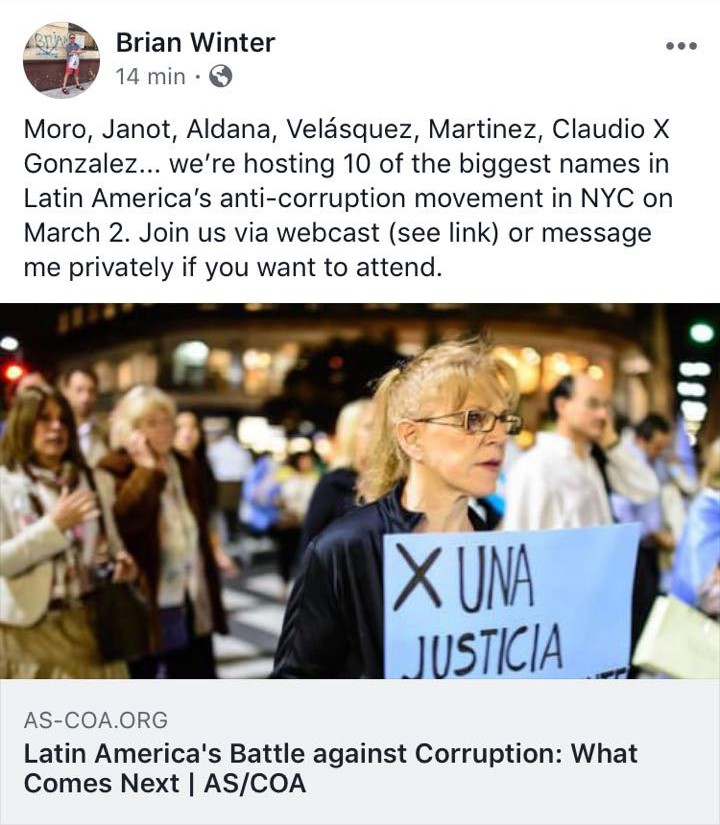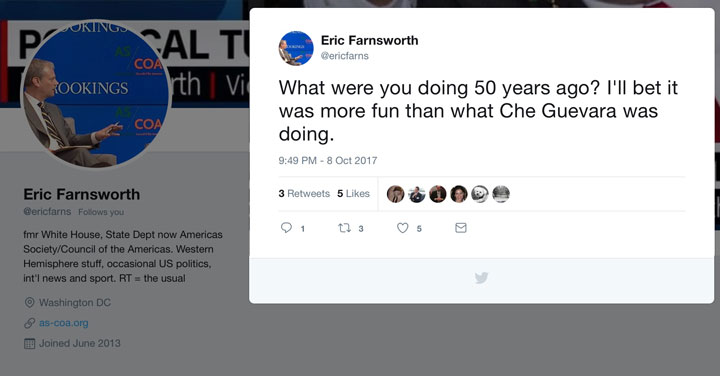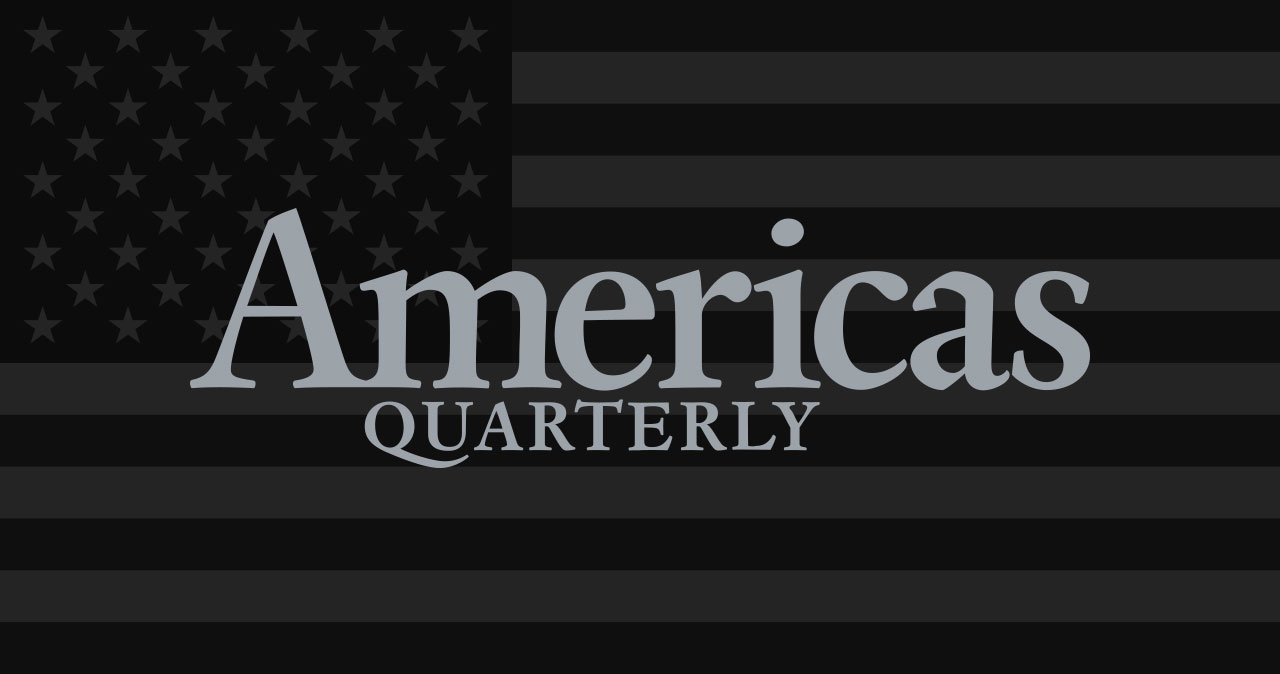On March 2 in New York, Wall Street Lobby & Think Tank, AS/COA will hold a special event in New York heralding a supposed “Anti-Corruption movement” in Latin America. Key speaker at the AS/COA event, Operation Lava Jato judge Sérgio Moro will then reportedly be named man of the year at another special event sponsored by the major Banks.

This earlier article explains the history of the US “War on corruption”, for which AS/COA have acted akin to a public relations agency, in part through its magazine, the self-styled “policy journal for the Western Hemisphere” Americas Quarterly, but also through tentacles extending into Latin American politics, judiciary, media, and academia.
Beyond its connections to US Government, holding a yearly event at the State Department itself, publisher of Americas Quarterly, AS/COA (Americas Society / Council of the Americas) is home not only to the major banks, extractive corporations and tech giants, but also the main platforms with which to propagandise on Latin America in the interests of its patrons, such as Bloomberg. It also has links through personnel to Reuters and other major news organisations. Its own Americas Quarterly laughably advertises itself as “the real Latin America, not the one you see on Twitter”, which is ironic, not only considering that its employees are extremely active on the platform, but that Twitter itself is a Council of the Americas corporate member.

Niche imperialist humour from Eric Farnsworth, VP of Council of the Americas
President & CEO Susan Segal, called by some “the most influential woman in the Americas” boasts that it is now a hemispheric organisation and aims to expand further, even doubling its size in the coming decade. It is a case study in how politicans, policy and democracy itself are captured through direct personal relations and incentive by transnational corporate power.
The current editor-in-chief of Americas Quarterly, and vice president for policy at Americas Society/Council of the Americas, Brian Winter, also writes for other outlets such as Newsweek & CNN, in the capacity of Brazil expert. Other COA personnel are also invited on network news as talking heads to discuss Latin American politics as if neutral observers. In August 2016, as Dilma Rousseff’s removal by “Soft” Coup loomed, Winter predicted that the Brazilian football team’s victory in the Rio Olympics could be a cathartic moment for the country that would allow it to move on from the political and economic crisis it was facing. At that very time, Anti-Coup protesters were facing brutal repression from Military Police, and this take was a dark echo of how football was used as a propaganda tool during the regime of dictator Emílio Médici in 1970.
Winter, having previously ghostwritten biographies on US-aligned leaders from the region such as Colombia’s Avaro Uribe and Brazil’s own Fernando Henrique Cardoso, left Reuters Brasil for AS/COA in 2015, with the Coup already in motion, just weeks after he was seen to be caught censoring the role of Cardoso’s US-favoured PSDB in the Petrobras corruption scandal – involvement which pre-dated Lula’s Presidency. His colleagues insisted that his departure was a complete coincidence.
Despite regular public manouvering from its editors, AQ is consistently the most overt platform for narrative shaping on Latin America from the North.
Originally called “Business Group for Latin America”, COA was set up by David Rockefeller, then president of Chase Manhattan Bank, at the request of President Kennedy in the years following the Cuban Revolution in 1959, to help combat the spread of Leftist Governments in the hemisphere. Rockefeller remained at its head until his death in 2017. Other notable staff include former Deputy US Secretary of State, first Director of National Intelligence, key plotter in Venezuela’s failed 2002 Coup and overseer of war crimes in Central America, John D. Negroponte.
AS/COA’s slogan is “Uniting opinion leaders to exchange ideas and create solutions to the challenges of the Americas today” and its online biographies state: “Americas Society (AS) Is the premier forum dedicated to education, debate, and dialogue in the Americas. Its mission is to foster an understanding of the contemporary political, social, and economic issues confronting Latin America, the Caribbean, and Canada, and to increase public awareness and appreciation of the diverse cultural heritage of the Americas and the importance of the inter-American relationship.”, “Council of the Americas (COA) Is the premier international business organisation whose members share a common commitment to economic and social development, open markets, the rule of law, and democracy throughout the Western Hemisphere. The Council’s membership consists of leading international companies representing a broad spectrum of sectors, including banking and finance, consulting services, consumer products, energy and mining, manufacturing, media, technology, and transportation.”
The organisation is said to be based on the “fundamental belief that free markets and private enterprise offer the most effective means to achieve regional economic growth and prosperity.” Membership has grown to over 200 blue chip companies that represent the majority of U.S. private investment in Latin America. The Council hosts presidents, cabinet ministers, central bankers, government officials, and leading experts in economics, politics, business, and finance, which gives it unique access to information from the region. The Council of the Americas argues that “free markets and private enterprise offer the most effective means to achieve regional economic growth”. It has been a supporter of free trade agreements and has been instrumental in the conception of the North American Free Trade Agreement (NAFTA) and the Central American Free Trade Agreement (CAFTA)….and the yet to be implemented Free Trade Area of the Americas (FTAA), the long-held ambition of David Rockefeller himself. Meanwhile, sister organisation The Americas Society’s focus is in contrast “to increase public awareness and appreciation of the diverse cultural heritage of the Americas and the importance of the inter-American relationship”
Elite COA corporate members include: Bloomberg, Blackrock, Bank of America, Barings, Barrick Gold Corporation, Boeing, Bombardier, Banco Bradesco, Banco do Brasil, Banco Santander, Cisco, Citigroup, Coca Cola, ExxonMobil, Ford, General Electric, General Motors, Google, Itaú Unibanco, IBM, Johnson & Johnson, JP Morgan Chase, Lockheed Martin, McDonalds, Moody’s, Morgan Stanley, Microsoft, News Corp / Fox, Pearson, Pfizer, Philip Morris, Raytheon, Shell, Television Association Of Programmers Latin America, Time Warner/Turner, Toyota, Viacom, Wal-Mart. One of the successor companies to Standard Oil, Chevron Corporation is listed as “Patron Corporate Member” of Council of the Americas, and has had a long vested interest in who governs Brazil. In 2010 Chevron was exposed recruiting journalists to spy for it in Latin America.
Council of the Americas members have benefitted greatly from Brazil’s Coup d’état of 2016. The markets will be watching Brazil’s 2018 Presidential election very closely, predicts Council of the Americas member Bloomberg, when the electorate will line up at polling stations across the country to have their votes counted by Council of the Americas member Smartmatic. Council of the Americas member the FT report that shares of Council of the Americas member Boeing have risen sharply on the news that they may be allowed to acquire Brazilian crown jewel aerospace manufacturer Embraer. Meanwhile Council of the Americas members Chevron and ExxonMobil are enjoying the fruits of their cut-price acquisitions of Brazil’s offshore Oilfields, now free of the requirement to include Brazilian Oil Company Petrobras in their exploitation. Council of the Americas member Monsanto is cleared by the Temer Government, controlled by the Ruralist lobby, to sell more of its toxic pesticides than ever, while Council of the Americas member Microsoft has a multi-billion dollar deal to replace Brazil’s modern open source software with Windows, and Council of the Americas member The Coca-Cola company are in talks with the Temer Government about the privatisation of the Guarani Aquifer, one of the world’s principal water resources.
The benefits to foreign companies resulting from the 2016 Coup echo that of 1964. In her book United States Penetration of Brazil, Jan K. Black explains how former CIA agent Philip Agee confirmed many of the findings and suspicions of a Brazilian congressional commission into Foreign interference in Brazil’s 1962 Election. The investigation revealed that of the (CIA) Rio Station’s main political-action operations, the Brazilian Institute for Democratic Action (IBAD) and a related organisation called Democratic Action (ADEP) spent between 12-20 million dollars financing anti-Goulart/anti-Communist candidates during the 1962 electoral campaign. The parliamentary investigating commission was controlled somewhat-five of its nine members were themselves recipients of IBAD and ADEP funds-but only the refusal of the First National City Bank, the Bank of Boston, and the Royal Bank of Canada to reveal the foreign source of funds deposited for IBAD and ADEP “kept the lid from blowing off”. Beneficiaries of IBAD were prominent among the conspirators in the coup of 1 April and some, particularly military beneficiaries, were among who gained power as a consequence of it: Standard Oil of New Jersey, U.S. Steel, Texas Oil, Gulf Oil, Hanna Corporation, Bethlehem Steel, General Motors, and Willys Overland among the depositors in the accounts of IBAD-ADEP-Promotion. Economist & Environmentalist Jean Marc von der Weid maintained that “more than one hundred foreign enterprises and some national ones were involved in financing the institute”, and that the Rockefeller Group-IBEC was one of the major benefactors.
Challenge any of its staff on the organisation’s dark history and you will be unlikely to get a response. Its self-promotion as benign, friendly, even inclusive, organisation is preposterous.
Americas Quarterly exists in the shadows between journalism and transnational corporate/political propaganda, in admittedly precarious times for the former. If there is a Non Governmental Organisation most invested in influencing how the English-speaking world perceives political/economic realities of Latin America, it is arguably AS/COA. The organisation’s purpose is to push policy towards frameworks such as FTAA, and therefore has a stake in who governs in the Americas. It is also undeniably well-resourced and connected.
The weaponisation of anti-corruption is as old as politics, and AS/COA has championed this often selective and spurious concept across Latin America, ignoring any collateral damage – social, constitutional or economic. It is a tool of convenience which just so happens to enable the removal of political opponents to their particular vision of “free trade”, in particular those wanting economic & resource sovereignty and independent foreign policy. Operation Lava Jato has been called “Lawfare” by critics, and in helping create the media pretext for Temer taking power (despite him being personally implicated in the investigation) it has delivered a range of benefits to Transnational Capital, including a radical austerity and privatisation programme – a bridge to a future that could never have won at the ballot box. With loss of sovereignty and return to dependence, Brazilians are now akin to the defeated side of a war, a war that the majority of the population does not even know has taken place.
AS/COA’s reach and influence over journalists stretches beyond the magazine itself, functioning like an ecosystem. In particular there is a great deal of overlap and interaction between AS/COA, Reuters, Washington Post and Bloomberg. It has reached out and built patronage networks not only with journalists but also academics at institutions such as FGV. The functional incentive is rarely ideological, but simply professional self-preservation and financial reward. In 2015 AQ championed a report which asserted that poverty had no correlation with crime & public security. This is unsurprising when the enemy of transnational Capital in Latin America (or anywhere) is a rising minimum wage. Elsewhere they have pushed opinion pieces against quota programmes aimed at improving racial equality in universities. There is also a tragic irony in AS/COA’s emphasis on “corporate feminism”, when they had tacitly supported the illegitimate ouster of Brazil’s first female president, and backed the ascendence of Post-Coup President Michel Temer, a profoundly chauvinistic throwback who dissolved the National Women’s Rights Ministry during his first days in office, created the first all-male cabinet since 1970s Dictator Geisel, and in a startling speech on international women’s day, minimised their role to housekeeping & raising children.
Worse still, in October 2017, AS/COA held a private, strictly off-the-record meeting in New York with notorious misogynist and fascist, 2018 Presidential candidate Jair Bolsonaro, who twice made threatening rape related remarks to fellow congresswoman Maria de Rosario, for which he was prosecuted. He is also famously racist and homophobic – at odds with AQ & AS/COA’s latest claim to inclusivity and diversity. His meeting with COA evidently went well, as it was followed by a normalising AQ cover appearance equating him electorally as a so-called “populist” with Mexican socialist Andres Manuel Lopez Obrador. The extreme-right Brazilian was described by AQ as merely an “Arch-Conservative”. Bolsonaro was most recently in the news suggesting a “final solution” to organised crime in Rio de Janeiro’s Rocinha favela, home to 100 thousand people, was to drop leaflets by helicopter advising criminals that they had 6 hours to leave, and if they did not, machine gun the favela. Previously in the 1990s he said that 30,000 people needed to be killed in order for Brazil to function. AS/COA have so far refused to divulge the content of their meeting with Bolsonaro.
Capital favouring a far-right authoritarian who will protect their investments in a resource rich country? It wouldn’t be the first time, neither the first time Council of the Americas have been in support of such a leader: Chile’s Pinochet the best known example. In ‘Price of Power’ Seymour Hersh wrote of the COA’s decade-long campaign to control Chile’s Democracy: “(1964 Candidate) Frei, who was fully aware of the source of his funding, also received covert help from a group of American corporations known as the Business Group for Latin America….It included on its executive committee such prominent corporation executives as C. Jay Parkinson, board chairman of Anaconda; Harold S. Geneen, head of the International Telephone and Telegraph Corporation, which owned and operated the telephone facilities in Chile; and Donald M. Kendall, chairman of PepsiCo, the softdrink company, which had extensive business activities in Latin America. The CIA and the Business Group, which by 1970 had been reorganized into the Council of the Americas, relied heavily on Edwards to use his organization and his contacts to channel their moneys into the 1964 political campaign. Many of the ties between the Business Group and the CIA in 1964 remained in place long after the election. For example, Enno Hobbing, a CIA official who had initially been assigned as liaison to the Business Group, eventually left the CIA and became the principal operations officer for the Council.”
Indeed for a Latin America-focussed organisation, it is telling that not one of its employees chooses to publicly commemorate as they would other historical dates, Chile’s own 9/11, the 1973 Coup which ended in the death of elected President Salvador Allende. Brian Winter prefers to describe his nemesis, General Augusto Pinochet, not as a genocidal dictator, but a “Revolutionary”.
The region understands perhaps more than any other that there is no distinction between US governmental and corporate power; foreign policy serves the monopolies, and creditor cartel. Meanwhile the comprador class want protection of their elite privilege from competition, hegemony provides that, and AS/COA are the closest thing to a direct liaison with it. Either side of that bargain have been historically comfortable with fascist rule if it protects their interests.
If you work with them you are knowingly or unknowingly participating in a decades-long neocolonial programme intended to destroy popular participation and sovereignty in Latin America, if you can live with that.
[qpp]

